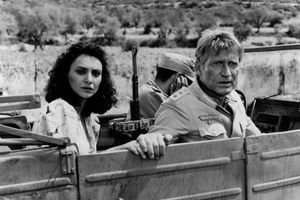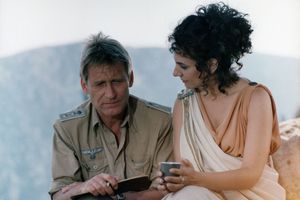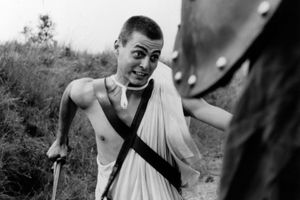Der Fall Ö.
Director: Rainer Simon, Color, Feature Film
Bundesrepublik Deutschland (BRD); Deutsche Demokratische Republik (DDR)
DEFA-Studio für Spielfilme / TORO-Film GmbH, Berlin, 1990
- Film/Video Format
- 35 mm
- Length in m
- 2605
- Other Title
- Der Fall Ödipus
- English Title
- Case For Decision Oe.
- Premiere Date
- Release Date (for Cinema)
- Premiere Air Date (for TV)
- Literary Source
- Fühmann, Franz: "König Ödipus", Erzählung
Short Summary (English)
During the Greek summer in the war year of 1944, a German military unit sets up camp on the plateau of Thebes. Armed with a 16 mm camera, the captain of the unit, a former professor for classical Greek philology, comes up with the idea to film the myth of Oedipus.
While the captain himself takes the role of the wise seer, Theiresias, the other roles in the film are played by soldiers, local Greeks - both professional and amateur actors are involved. A young private is chosen to play the part of Oedipus, but having no knowledge of the destiny of the character he is to portray, the young soldier questions the life and deeds of Oedipus as if they were his own. Like the mythical king, the young private falls in love with the Greek actress who plays the role of Queen lokaste (his mother and wife, as everybody knows). But, alas, the captain fancies the same woman. In as much as the horrors of war are far away, it would appear that life can be played out as in a film. But the final realization is that guilt, like in the case of Oedipus, cannot be suppressed - neither in myth, nor in 1944 German-occupied Greece and most certaintly not in the here and now of today.
Source: Progress Film-Verleih

(Dir.: Rainer Simon, 1990) Photography: Wolfgang Ebert

(Dir.: Rainer Simon, 1990) Photography: Wolfgang Ebert
Film Crew
- Director
-
- Rainer Simon
- Script
-
- Rainer Simon
- Ulrich Plenzdorf
- Scenario
-
- Ulrich Plenzdorf
- Camera
- Film Editing
-
- Helga Gentz
- Margrit Brusendorff
- Cast
-
- Matthias Habich (Hauptmann / Teiresias)
- Sebastian Hartmann (Gefreiter / Ödipus)
- Tatiana Lygari (Griechische Schauspielerin / Königin Iokaste)
- Jan Josef Liefers (Obergefreiter / Kameramann)
- Klaus Pönitz (Hauptfeldwebel)
- Herbert Sand (Maskenbildner)
- Christos Tsangas (Griechischer Schauspieler / Kreon)
- George Moshidis (Bauer aus Theben)
- Nicos Papakonstandinou (Bote aus Korinth)
- Peter Zimmermann (Funker)
- Wilfried Loll (Koch / Wagenlenker Laios)
- Jörg Simonidis (LKW-Fahrer)
- Hagen Oechel (Kübelfahrer / Requisiteur)
- Mathias Mertens (Herold / Fahrradmelder)
- Marian Wolf (Kradfahrer)
- Frank Haberland (Kradfahrer)
- Volker Ranisch (Posten am Tor)
- Kyriakos Sarandis (Alter Thebaner)
- Christos Nikitaidis (Opferjunge)
- Jannis Midronatsios (Vater des Opferjungen)
- Athanasia Maladra (Mutter des Opferjungen)
- Andreas Marianos (Feldjäger)
- Vasilis Ladas (Opferpriester)
- Olaf Hilliger (Soldat)
- Jörg Landgraf (Soldat)
- Petr Skarke (Soldat)
- Torsten Israel (Soldat)
- Stephan Baumecker (Soldat)
- Assistant Director
-
- Andreas Kleinert (Assistenz-Regie)
- Assistant Camera
-
- Dietram Kleist
- Wolfgang Ebert
- Production Design
-
- Hans Poppe
- Script Editing
-
- Peter Jakubeit
- Music
-
- Friedrich Schenker
- Sound
-
- Jürgen Mathuschek
- Christfried Sobczyk (Tonmischung)
- Costume Design
-
- Günther (auch Günter) Heidemann (geb. Schmidt, auch Schmidt-Heidemann)
- Make-Up
-
- Klaus Friedrich
- Ursula Funk
- Props
-
- Jörg Danneberg
- Lutz Pinnow
- Production Management
-
- Dorothea Hildebrandt
- Wolfgang Bajorat
- Unit Production Management
-
- Günter Berger
- Lutz Richter-Mendau
- Content Editing
-
- Wolfgang Patzschke
- Consulting
-
- Eberhard Paul
- Rainer Eckert
- DEFA Photography
-
- Wolfgang Ebert
Short Summary (German)
Sommer 1944. Im von deutschen Truppen besetzten Griechenland dreht ein Hauptmann der Wehrmacht mit einer 16mm-Kamera und Soldaten und einigen Einheimischen einen Amateurfilm nach Sophokles‘ "König Ödipus". Er selber spielt den Seher Teiresias. Im zivilen Leben ist der Hauptmann Professor für Altgriechisch. Der den Ödipus spielende naive Gefreite, der den Stoff nicht kennt, sieht sich plötzlich mit Fragen von Schuld und Sühne konfrontiert. Er und auch sein Vorgesetzter verlieben sich in die griechische Darstellerin der Iokaste. Doch die Kriegsrealität beendet ihr Spiel. Nach einem Partisanenüberfall werden die griechischen Schauspieler als Geiseln genommen. Als sie fliehen, lässt der Hauptmann das Feuer auf sie eröffnen. Der Gefreite "Ödipus" erschießt "Iokaste", der Hauptmann sich selbst.
(Quelle: Das zweite Leben der Filmstadt Babelsberg. DEFA-Spielfilme 1946-1992)
Short Summary (Other Languages)
Nell'estate del 1944, nella Grecia occupata dalle truppe tedesche, un comandante della Wehrmacht gira assieme ai soldati e alla gente del luogo un film amatoriale sull'Edipo Re di Sofocle. Lui stesso, che nella vita civile è professore di greco antico, interpreta il ruolo di Tiresio, mentre l'ingenuo caporale, nei panni di Edipo, si trova improvvisamente a dover affrontare il tema della colpa e della penitenza. Entrambi s'innamorano della ragazza greca che interpreta Giocasta. Ma la guerra interrompe lo spettacolo. A seguito di un assalto partigiano, gli attori greci vengono fatti prigionieri. Di fronte a un tentativo di fuga, il comandante apre il fuoco: il caporale "Edipo" uccide Giocasta, mentre il comandante si suicida. (Italienisch)
Eté 1994. En Grèce sous occupation allemande. Un capitaine de la Wehrmacht tourne un film en 16mm sur "Oedipe roi" de Sophocle avec des soldats et quelques habitants. Il joue lui-même le devin Tirésias. Dans la vie civile, le capitaine est professeur de grec ancien. Le brigadier naïf qui joue Oedipe, qui découvre la pièce au fur et à mesure, se retrouve confronté soudainement à des questionnements sur la culpabilité et du pardon. Il tombe amoureux, de même que ses supérieurs, de la jeune interprète grecque de Jocaste. Mais la réalité de la guerre les rattrape: lors d'un raid des partisans, les interprètes grecs sont pris en otage. Alors qu'ils tentent de fuir, le capitaine ordonne d'ouvrir le feu. Le jeune Brigadier "Oedipe" tue "Jocaste", alors que le capitaine se suicide. (Französisch)



